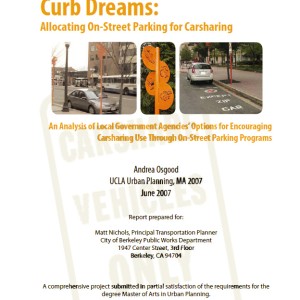
Authors: Andrea Osgood
Date: June 1, 2007
Project: [wpv-post-link id=”$project”]
Cities face a growing number of transportation challenges — from finding ways to reduce the air and water pollution caused by cars and trucks, to dealing with steadily increasing congestion and traffic delays, to providing mobility options for those who do not own a car. In addition to these local and immediate concerns, many cities are also increasingly interested in addressing global warming. Carsharing — a service that offers individuals access to cars for an hourly and/or mileage-based fee — is a unique transportation solution that can address each of these difficult and critical issues. Creating an on-street parking policy for carsharing is one of the most effective ways for the City of Berkeley to encourage the growth of this unique transportation mode. Other forms of support, such as financial grants, will promote the growth of carsharing, but on-street spaces create extra value on top of the simple monetary value of the parking spaces themselves. This extra value creation occurs in two key ways. First, the added time savings and convenience of on-street spaces increase the returns and benefits to existing members, making them more likely to promote carsharing to family and friends. Second, these same time savings and convenience benefits will encourage other individuals to reevaluate the cost of driving their own vehicle — and should lead to an increase in overall carsharing memberships. Even if the City takes steps to ensure that the public receives adequate returns for their investment of the public parking spaces, some people will still oppose the policy, as it limits access to a formerly free resource. However, free parking has had drastic impacts on the health and vitality of cities, and the City should do everything in their power to move forward with an on-street parking policy for shared cars. Carsharing’s benefits to society are proven. And, with such a program, the City will be providing cleaner air and water to all of its citizens, reducing its impact on global warming and providing mobility solutions for its poorest residents. Further, more limited parking might encourage more people to become carsharing members, or use alternative transportation modes — which will create a positive cycle and only increase the benefits of carsharing.
Link to Publication